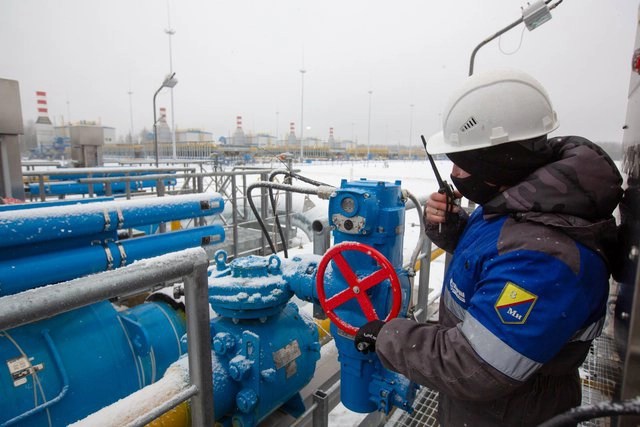Supply is scarce
Moscow has cut gas supplies in retaliation for Western sanctions, but these countries may still be able to accumulate enough for the coming winter.
It is a miracle for this region because Europe is gradually having to “cut off” from the region’s largest energy source. Europe has reduced oil imports to limit profits for Moscow, while Russia has shut down important gas pipelines.
Data from research firm Wood Mackenzie shows that Russia’s share of natural gas imports has fallen from 36% in October last year to just 9% a year later. The EU’s imports of Russian crude oil fell 33% before the ban took effect in December, according to the International Energy Agency.
Europe is currently planning to end its dependence on Russian fossil fuels by 2027, and is increasing imports from Norway and Algeria, as well as liquefied natural gas (LNG) from the United States, to make up for the lack.
According to European Gas Infrastructure, gas storage facilities are 91 percent full, far exceeding the 80 percent target EU officials set for countries in November.
But this achievement comes at a cost to the economy: the search for alternative sources has sent energy prices skyrocketing. European gas prices have plummeted since peaking in late August but are still 265% higher than a year ago, burdening households and businesses and forcing governments to fund huge subsidies.
Germany, Europe’s manufacturing powerhouse, expects its economy to shrink 0.4 percent next year.
Georg Zachmann, a senior fellow at Bruegel, a Brussels-based consultancy, told CNN Business: “The dependence on Russia will be gone next year. However, it will not be until after 2025 that prices will in Europe is reasonable again”.
Just a starting point
Even with gas stocks nearing full capacity, the region’s energy security remains precarious, with power outages and gas allocations still possible in the coming months in the event of supply shortages continued to shrink, and winters were even colder.
The bloc is likely to continue to face supply disruptions early next year if Russia decides to cut off remaining gas supplies from this month, according to a July report by the International Energy Agency.
Alexei Miller, CEO of Russian energy giant Gazprom, said there is “no guarantee” that Europe will make it through the winter with current reserves. He said Germany’s stockpile would only meet the demand for up to 10 weeks.
The replenishment of those stockpiles next year is seen as Europe’s next big test.
The International Monetary Fund has warned Europe’s energy crisis is not “a temporary shock” and that the “winter of 2023 is likely to be worse than this winter.”
When fuel imported from Russia disappeared, Europe used liquefied petroleum gas (LNG) to replace it. Combined, Europe and the UK imported nearly 68% more LNG from sources other than Russia between March and September this year, compared with the same period in 2021.
However, global competition for LNG is already fierce and could become even more intense if – as expected – the Chinese economy starts to accelerate again next year.
Sindre Knutsson, senior vice president of gas and LNG at research firm Rystad Energy, told CNN: “The rebound in Chinese demand for LNG could also pose a challenge to Europe’s ability to buy LNG,” Europe next year”.
Oil supplies could also be tight, despite expectations that global demand growth will slow next year as economies slow. The Organization of the Petroleum Exporting Countries and its partners (OPEC+) last week said it would cut oil production by 2 million BPD from November.
Source: CafeF
Source: Vietnam Insider

